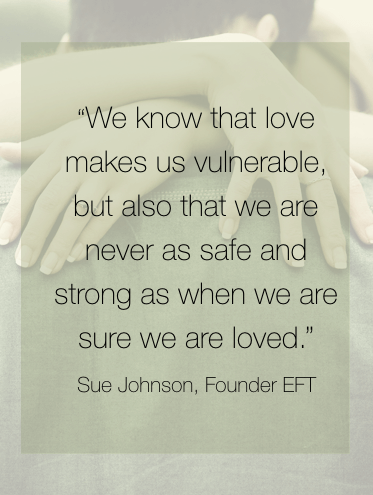
Emotionally Focused Therapy (EFT)
EFT is based on the belief that emotional bonding is one of our deepest human instincts. Our need for attachment plays out in all of our interactions, and when a couple struggles in their primary relationship, it is often a basic attachment issue. Each of us desperately wants to know that our partner is there for us.
EFT works on the attachment issues and past hurts of each partner in order for them to bond together and create a healthy, loving relationship. With a secure emotional connection, partners more easily communicate and solve problems.
How we can help!
If you want to rediscover your love, find better solutions to current problems, reconnect after years of distance, or develop the type of relationship you want to model for your children, EFT may be for you.
Maybe your relationship just needs a tune-up or perhaps you are feeling like your relationship won’t survive. Give yourself the chance to love again!
Using EFT with couples has been shown to create LASTING CHANGE. Where other therapy gains dwindle after termination, research shows that couples that have used EFT continue to improve even outside of therapy.
More specifically, EFT has worked with many different types of couples: depression, anxiety, infidelity, medical illness, forgiveness dilemmas, parents raising children with autism and other illness, same sex couples, and varied cultural groups.
How does it work?
EFT uses a systematic road-map to guide each couple towards emotional connectivity. There are 9 steps divided into 3 stages.
Stage 1
- Step 1: Identify the conflict
- Step 2: Identify the cycle where conflict is expressed
- Step 3: Access unacknowledged emotions
Stage 2
- Step 4: Reframe — Victims of the cycle and now allies against it
- Step 5: Promote identification of disowned needs
- Step 6: Promote partner acceptance
- Step 7: Facilitate expression of needs and wants
Stage 3
- Step 8: New solutions
- Step 9: Consolidation
Live purposefully. Love fully. Grow with us!

Emotionally Focused Therapy (EFT)
EFT is based on the belief that emotional bonding is one of our deepest human instincts. Our need for attachment plays out in all of our interactions, and when a couple struggles in their primary relationship, it is often a basic attachment issue. Each of us desperately wants to know that our partner is there for us.
EFT works on the attachment issues and past hurts of each partner in order for them to bond together and create a healthy, loving relationship. With a secure emotional connection, partners more easily communicate and solve problems.
How we can help!
If you want to rediscover your love, find better solutions to current problems, reconnect after years of distance, or develop the type of relationship you want to model for your children, EFT may be for you.
Maybe your relationship just needs a tune-up or perhaps you are feeling like your relationship won’t survive. Give yourself the chance to love again!
Using EFT with couples has been shown to create LASTING CHANGE. Where other therapy gains dwindle after termination, research shows that couples that have used EFT continue to improve even outside of therapy.
More specifically, EFT has worked with many different types of couples: depression, anxiety, infidelity, medical illness, forgiveness dilemmas, parents raising children with autism and other illness, same sex couples, and varied cultural groups.
How does it work?
EFT uses a systematic road-map to guide each couple towards emotional connectivity. There are 9 steps divided into 3 stages.
Live purposefully. Love fully. Grow with us!
Stage 1
- Step 1: Identify the conflict
- Step 2: Identify the cycle where conflict is expressed
- Step 3: Access unacknowledged emotions
Stage 2
- Step 4: Reframe — Victims of the cycle and now allies against it
- Step 5: Promote identification of disowned needs
- Step 6: Promote partner acceptance
- Step 7: Facilitate expression of needs and wants
Stage 3
- Step 8: New solutions
- Step 9: Consolidation

